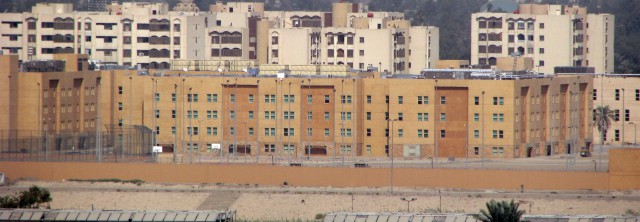
WASHINGTON — The $736 million new U.S. Embassy in Baghdad,
which American diplomats have occupied for 18 months, contains “multiple
significant construction deficiencies” and the U.S. government should try
to recover more than $130 million from the contractor who built it, according
to a report to be released Thursday.
The report, by the State Department’s inspector general,
cites flaws in numerous systems throughout the embassy complex and says that
the contractor, First Kuwaiti General Trading & Contracting Co., failed to
properly design, construct and commission the largest U.S. Embassy overseas.
It also cites failures by the former leadership of the State
Department bureau that’s responsible for constructing overseas diplomatic
posts. Officials there said that those failures had been rectified, and they
took issue with some aspects of the inspector general’s report.
McClatchy and other news outlets have reported extensively
about the troubled embassy project, which encountered delays, reports of shoddy
workmanship and allegations — never proved — of abusive labor practices by
First Kuwaiti.
However, the inspector general’s 58-page report, sent to
Congress on Wednesday, is the first to confirm that the problems persisted
after the embassy was occupied beginning in April 2008, and it puts a dollar
figure on fixing them.
In one finding, the report says that “safe areas,”
used to protect staff in emergency situations, “were not constructed
according to contract specifications.”
The audit, conducted with help from the Army Corps of
Engineers, also found problems with the embassy’s water treatment plant, power
systems, walls and concrete walkways, and fire protection systems. It found
“plumbing deficiencies” at more than 200 locations.
Rod Evans, of the State Department’s Bureau of Overseas
Buildings Operations, said Thursday that officials were reviewing what he
called “deviations” from the contract specifications to determine
what must be fixed.
“Nothing is impinging on the operations of the
embassy,” Evans said.
Other State Department officials called the inspector
general’s estimate that First Kuwaiti owes the U.S. government $132 million
highly speculative. They said it was doubtful that taxpayers would recover more
than a small fraction of that.
The report blames many of the embassy buildings’ woes on a
decision by the then-head of overseas construction at the State Department,
retired Army. Maj. Gen. Charles Williams, to set up a separate, secretive unit,
answerable only to him, to oversee the Baghdad project.
Williams retired under fire in December 2007. In comments
appended to the report, Overseas Buildings Operations officials say that
creating a stand-alone office was a mistake.
The inspector general’s report also suggests that the
now-defunct office and its former head, who was a personal services contractor,
gave First Kuwaiti preferential treatment.
The office “was managed by an individual who did not
enforce contract provisions … which resulted in many of the contract
deficiencies listed,” it says. The individual, identified in previous news
reports as James Golden, also approved $69 million in advance payments to First
Kuwaiti that weren’t authorized by federal regulations, the report says.
The report acknowledges that, despite its flaws,
constructing a huge new embassy complex in the middle of a war zone in 34
months “was a significant accomplishment.”
Jonathan Blyth, a spokesman for the Bureau of Overseas
Buildings Operations, said that under a major embassy-construction program that
began in 2000, the State Department had finished an unprecedented 68 projects
overseas, and had another 35 under way.
“The record is one of success,” Blyth said. The
approach used with the Baghdad Embassy “was probably not the best
approach, and one we’re not going to repeat,” he said.
First Kuwaiti steadfastly has defended its work on the
embassy. When the buildings were certified as ready for occupancy in April
2008, the company’s managing director, Wadih al Absi, called it “a
remarkable accomplishment for our company.”
“We are proud of our record of achievement in Iraq and
regard the completion of the new U.S. Embassy compound in Baghdad as an
absolute success,” he said.
According to a State Department cable that McClatchy
obtained, the Kuwaiti government lobbied the Bush administration on behalf of
First Kuwaiti, which was seeking more U.S. government work.
During a dinner in Kuwait City on Jan. 11, 2008, attended by
then-President George W. Bush and Kuwait’s emir, a diplomat from the emirate
gave the U.S. delegation a package that included a DVD and testimonial with
praise for First Kuwaiti.
“We are confident (the controversy) will not adversely
affect ongoing relations between the United States and the state of
Kuwait,” the document said, according to the cable.














